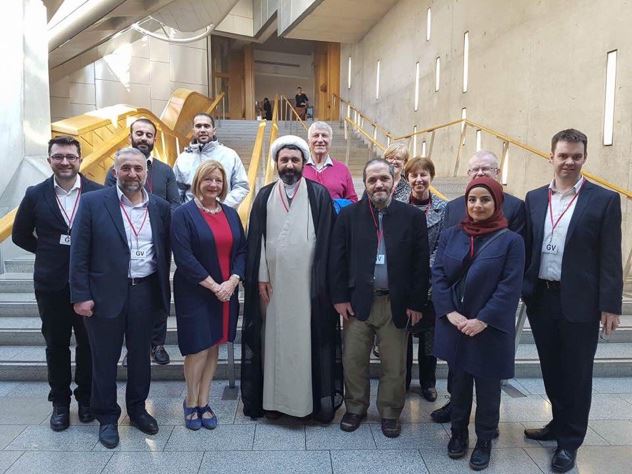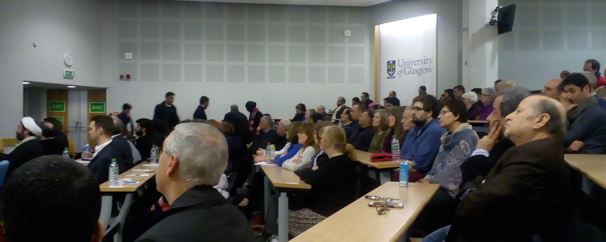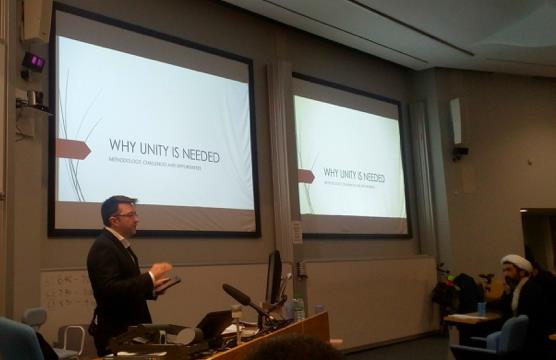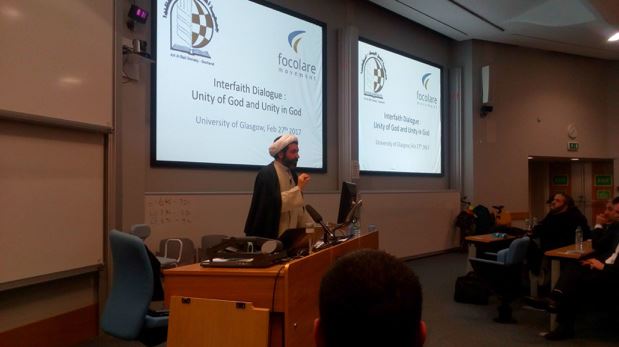The University of Glasgow was founded in 1451. On 27 February, in this prestigious place, which educated seven future Nobel winners and heard Albert Einstein demonstrate his theory of relativity, the Focolare Movement and the Islamic society Ahl Al Bait coordinated an evening lecture on interfaith dialogue and unity.
The evening was entitled “Unity of God and Unity in God.” One of the guest speakers was the well-known figure of the Shiite world, Dr. Mohammad Ali Shomali, Director of the International Institute of Islamic Studies at Qum, Iran; Dr Shomali is currently Director of the Islamic Centre of Great Britain. The other guest speaker was Professor Paulo Frizzi, lecturer in Theology and the Practice of Interreligious Dialogue at the Sophia University Institute in Loppiano, near Florence, Italy, where he coordinates the Sophia Global Studies Research and Training Centre. On 28 February Dr Shomali delivered the ‘Time for Reflection’ in the Scottish Parliament.
The friendship between Sophia University Institute and Dr Shomali is long-standing. Last summer they began a joint project of dialogue and research which brings together Christian and Muslim scholars academics. The project is entitled Wings of Unity.
Dr Frizzi explains, “I presented the methodology and culture that the Sophia Institute promotes, whereby we work with an academic approach that is integrated and where experience and practice are placed alongside the theory. For example, a course on interreligious dialogue is taught by three of us from different academic backgrounds and experiences, and yet we try to develop a common programme through reciprocal listening: it’s a sort of a journey of unity in which we co-teach the lessons and the students play a leading role.”
“Wings of Unity, Frizzi continues, “provides a physical space for dialogue. On the one hand students can deepen their understanding of what “unity of God and in God” means, clarifying elements of difference and those held in common; on the other, they can explore the ways in which unity can be tangibly lived, thereby healing wounds and resolving differences.
Too often interfaith initiatives only touch on the questions of the few, without a tangible impact. We are living in delicate times, and we have to take into account the transition towards an uncertain new world order, where greater interconnectivity and interdependence sit alongside painful divisions that fracture the unity of society. Globalization has probably failed in its attempt to build sustainable communities, as multinational institutions fail to guarantee a safe space where cultures and religions can meet without the risk of losing themselves.
This may be true, but on the other hand there is experience, commitment and dialogue surging up which, in contrast, enriches neighborhoods and unifies communities. It begins deep down and helps us all think once again of unity amid diversity. As Pope Francis states in Evangelii Gaudium, dialogue happens in a world which is not a pyramid (where some are at the top over many others), nor a sphere (without any distinguishable sides), but instead is multifaceted, where all parts converge together while maintaining their own individuality.”
The next day, Dr Shomali shared the following thoughts with the Members of the Scottish Parliament: “If we reflect on how religions developed, we realize that one question has always been present: ‘How can we keep people together, convincing them that, if we stay in the circle, we are better off?’ The concept of identity caused us to distance ourselves from each other, in as much as we expressed not ‘who we are’, but rather ‘who we are not’ – a model of identity based on fear and exclusion. If it ever worked in the past, it was because the world was quite segmented, without great opportunities to meet as people of different faiths, ethnic groups or cultures. This is no longer the case in a world in which identity is more fragile and nuanced.” Because of this, suggested the Shiite scholar, “We need a new understanding based on what we can offer and what we can appreciate in others. To relate is essential. I cannot be a good Muslim or Christian – or a good Iranian or Scot – if I don’t know how to relate with others and include them in my identity.” The very concept of identity, therefore, needs a rethink. The human body has different organs, each with its own function. None of these, moreover, survives on its own.”
Dr Shomali concluded: “When I read the Quran, I see that this is God’s plan. In his creation and revelation, God showed us the way toward unity.”





